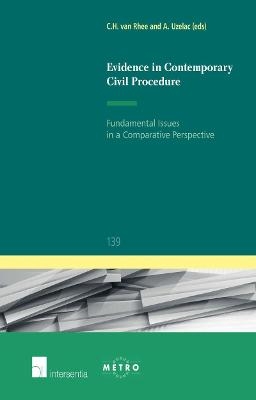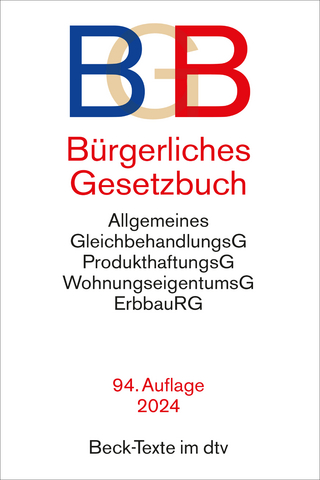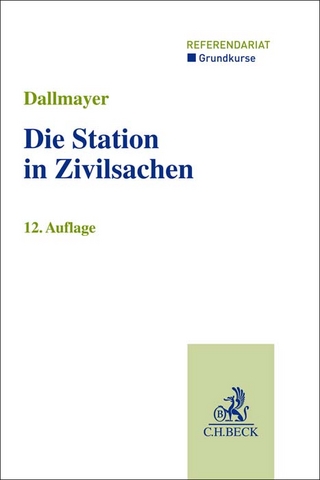
Evidence in Contemporary Civil Procedure
Intersentia Ltd (Verlag)
978-1-78068-338-6 (ISBN)
- Keine Verlagsinformationen verfügbar
- Artikel merken
A book series devoted to the common foundations of the European legal systems. The Ius Commune Europaeum series includes comparative legal studies as well as studies on the effect of treaties within national legal systems. All areas of the law are covered. The books are published in various European languages under the auspices of METRO, the Institute for Transnational Legal Research at Maastricht University. This book discusses the impact of EU law on selected national legal systems. The authors analyse how the civil procedure system of their country has reacted to increasing Europeanisation and influence of EU law. They identify significant changes and disseminate the reasons for particular developments and the further implications of EU law on the civil procedure.Europe is in a period of increasing Europeanisation of civil procedure. Procedural elements of EU law are based on decentralised enforcement, leaving enforcement and procedural issues to the Member States. Consequently, there is vast amount of EU case law that is relevant for national procedural law. The supremacy of EU law and, inter alia, the requirements of effectiveness and equivalence may be relevant for several topics of national civil procedural law, for example ex officio application of EU law, enforcement, insolvency proceedings, evidence, etc. Both EU legislation and doctrinal changes in EU case law touch upon various topics of the procedural law of the Member States. In a concluding chapter, a more comprehensive comparison between the countries represented in the book is made. Which doctrines, which pieces of legislation or features in legislation pose problems for national civil procedure? Are some legal systems or topics more prone to integrate European rules, and are others more resistant to changes? This book displays the Europeanisation of national civil procedure law and helps to understand this development from the perspective of Member States.
Alan Uzelac is Professor at the Zagreb University and Chair of Department for Civil Procedure of the Faculty of Law. His teaching and research includes issues of national and comparative civil procedure, arbitration and alternative dispute resolution, organization of judiciary, legal professions and procedural human rights. He holds degrees in law (LL.B., LL.M., LL.D.) and social sciences (M.A. (phil.), M.A. (literature)) from Zagreb University. He was visiting researcher and scholar at a number of universities, including Harvard Law School (Fulbright grant), and universities of Vienna (Austria), Maastricht (the Netherlands), Oslo (Norway), Kazan (Russia), and Pavia (Italy). As an active member of the International Association of Procedural Law and the German Association for International Procedural Law, he serves on the chief advisory bodies of both organizations (Council, Rat). Since mid-90s, he was engaged as national delegate of Croatia in the work of UNCITRAL Working Group for Arbitration and Conciliation were he participated in drafting of the several international instruments in the field of alternative dispute resolution. He was involved in various activities of the European Commission for the Efficiency of Justice (CEPEJ) of the Council of Europe, where he held different functions (inter alia: Bureau member from 2003-2006, President of the Task Force on Timeframes of Proceedings - TF-DEL 2005-2006). His professional experience includes work in various Croatian courts, Croatian State Bar Exam, and internship at the Secretariat of the ICC International Court of Arbitration in Paris. Over a period of ten years, Professor Uzelac was Secretary General of the Permanent Arbitration Court at the Croatian Chamber of Commerce. Throughout his career, he was often engaged as expert in various legislative projects. As an international expert he was engaged on a number of missions, assisting legal reforms and legal collaboration in Serbia, Bosnia and Herzegovina, Montenegro, Russia and Kosovo. Professor Uzelac also acts as member of the highest body for judicial appointments and discipline, the State Judicial Council in 2012-2015 period. 2
CONTENTSList of Authors Acknowledgements INTRODUCTIONC.H. van Rhee & A. UzelacEVIDENCE IN CIVIL PROCEDURE: THE FUNDAMENTALS IN LIGHT OF THE 21ST CENTURY Introduction 1. Fundamental and other Principles of Evidence in Civil Litigation 2. Types of Evidence in Civil Litigation 3. Evidence in Arbitration and National Civil Litigation 4. Evidence in Cross Border Civil Litigation Bibliography FUNDAMENTAL AND OTHER PRINCIPLES OF EVIDENCE IN CIVIL LITIGATIONA. UzelacEVIDENCE AND THE PRINCIPLE OF PROPORTIONALITY. HOW TO GET RID OF EXPENSIVE AND TIME-CONSUMING EVIDENCE? 1. Introduction 2. Ideology of 'Material Truth' and its Impact on Evidence-taking 3. The Seeds of Proportionality and the New Wave of Thinking about Procedure and Evidence-taking 4. Reforming Rules on Proof in Croatia: Free Assessment of Evidence5. Conclusion - A Change, but not too Fast Bibliography A. GalicDISCLOSURE OF DOCUMENTS IN CIVIL PROCEDURE: THE PRIVILEGE AGAINST SELFINCRIMINATION OR A QUEST FOR PROCEDURAL FAIRNESS AND SUBSTANTIVE JUSTICE 1. Introduction 2. The Limited Scope of Disclosure of Evidence in Slovenian Civil Procedure 2.1. Documents in the Possession of the Party Adducing Them 2.2. Documents in the Possession of the Other Party 2.3. Documents in the Possession of Third Parties and Public Authorities2.4. Lack of Access to Information in the Pre-action Stage 3. A Short Comparative Overview - Disclosure of Documents in Civil Law Jurisdictions 4. Some Lessons from EU Law 5. Evaluation and Conclusion Bibliography B. KarolczykPRECLUSION OF LATE ALLEGATIONS AND EVIDENCE AS A TOOL TO INCREASE THE EFFICIENCY OF CIVIL PROCEEDINGS IN POLAND: A SHORT STORY OF THE UGLY PAST AND THE WAY TO A BRIGHT FUTURE 1. Introduction 2. The Polish Model of Procedure: A View from Above 2.1. Theoretical Classification 2.2. A System in Flux 2.3. Constitutional Foundation 2.4. The Dogma of Truth-seeking 3. The Concentration of Procedural Material 3.1. Preliminary Remarks 3.2. The Ugly Past (Special Procedure for Commercial Matters until May 2012) 3.3. The Flexible Future under the New Law? 4. Conclusions Bibliography E. JeulandTHE 'RIGHT TO PROOF' AND THE 'LOYALTY PRINCIPLE': A FRENCH PERSPECTIVE 1. General Picture of Evidence Law in France 2. The Loyalty Principle 3. The Right to Proof as a Limitation to Loyalty Bibliography V. Rijavec & T. KerestesRESTRICTIONS ON THE ADMISSIBILITY OF EVIDENCE 1. Introduction 2. General Principle of Inadmissibility 3. Balancing of Interests and Restrictions on Evidence 3.1. Slovenia 3.2. Austria 3.3. Germany 3.4. Denmark 3.5. Estonia 3.6. Switzerland 3.7. Finland 3.8. Poland 3.9. Sweden 3.10. Romania 3.11. Latvia 3.12. Hungary 3.13. Ireland 3.14. France 4. Countries with no or Limited Restrictions on Evidence 5. Conclusions Bibliography M. RepasTAKING LENIENCY DOCUMENTS AS EVIDENCE IN DAMAGES ACTIONS IN CASES OF COMPETITION LAW INFRINGEMENT 1. Introduction 2. Public and Private Enforcement of Competition Law Rules 3. The Purpose and Aims of the Leniency Programme 4. Protection of Business and Other Professional Secrets 4.1. The Position of the EU Commission 4.2. The Position of National Competition Authorities - The Case of Slovenia 5. Disclosure of Leniency Documents in Damages Actions 5.1. General 5.2. Right to Access under Regulation 1049/2001 5.2.1. Right of Access under the Slovenian PIAA 5.2.2. Right of Access on the Request of National Courts 5.2.3. Court's Intervention under Slovenian Law 6. Directive 2014/104/EU and Disclosure of Leniency Documents 7. Conclusion Bibliography E. SilvestriLOST IN TRANSLATION? LANGUAGE DIFFERENCES AND THEIR IMPACT ON EVIDENCETAKING IN LITIGATION 1. Introduction 2. The Protection of Language Rights 3. Interpreting and Translating in Italian Civil Courts: Some Evidence-Related Issues 4. Conclusions Bibliography V. HarsagiEVIDENCE, INFORMATION TECHNOLOGY AND PRINCIPLES OF CIVIL PROCEDURE - THE HUNGARIAN PERSPECTIVE 1. Role of Principles in Civil Proceedings 2. Development of the Field 3. Communication during the Lawsuit: The Principles of Orality and Immediacy 4. The Principle of Free Evaluation of Evidence 5. Publicity - Inspection of Documents & Data Protection 6. Principle of Party Control v. Evidence Ex Officio 7. Specialities - Order for Payment Procedure 8. Summary Bibliography T. IvancTHE POTENTIAL IMPACT OF ELECTRONIC PROCEEDINGS ON TRADITIONAL PRINCIPLES OF CIVIL PROCEDURE - THE SLOVENIAN EXPERIENCE 1. Introduction 2. Relationship between the Law and New Technologies 2.1. The Use of Videoconferencing and the Question of the Oral Character of Procedural Acts 2.2. Adversarial System or Equality of Arms 2.3. Electronic Service of Documents 2.4. Free Evaluation of Evidence 2.5. Electronic Form versus Paper or Physical Form 3. Conclusion Bibliography TYPES OF EVIDENCE IN CIVIL LITIGATIONF. Hoogers, F. Fernhout, H. Jans, R. Mertens & V. PoelsWITNESS TESTIMONY IN DUTCH CIVIL PROCEDURE: FACTS, FIGURES AND STATISTICAL RELATIONS 1. Introduction 2. Dutch Civil Procedure 2.1. Two Basic Principles of Dutch Civil Procedure 2.2. Post-defence Hearing Model 2.3. Sieve Model2.4. Witness Evidence 3. Four Indicators to Assess Witness Examination 4. Research Design 5. Results 5.1. Length of Witness Testimony 5.2. The Way in which the Time of a Hearing was Spent 5.3. The Way a Witness is being Informed (Rechtsbelehrung) 5.4. Participation in a Witness Hearing 6. Conclusion Bibliography P.C. Chan & U.-U. RehmanCURBING ADVERSARIAL EXCESSES: AN EVALUATION OF THE EXPERT EVIDENCE REGIME IN HONG KONG AFTER THE CIVIL JUSTICE REFORM (WITH A FOCUSED STUDY ON PERSONAL INJURY LITIGATION) 1. Introduction 2. The Role of the Expert in Civil Litigation 3. The Civil Justice Reform and the Modification of the Expert Evidence Regime 4. The Procedural Rules Governing Expert Evidence and Analysis 4.1. Restrictions on Adducing Expert Evidence and Court's Power to Limit the Number of Expert Witnesses 4.2. Expert's Overriding Duty to the Court 4.3. Statement of Truth and its Effect on Expert Evidence 4.4. Code of Conduct of Expert Witness 4.5. Expert Witness's Declaration of Duty to the Court 4.6. Procedural Efficacy and Fairness 4.7. What is the Exact Realm of an Expert's Expertise?5. Single Joint Expert 6. Expert Evidence and Personal Injury Claims 7. An Overview of the Process 8. Joint Examination and Joint Report 9. Single Joint Expert in PI Cases 10. Critical Review of the Case Law on Expert Evidence in PI Cases 11. Further Reforms and Concluding Remarks Bibliography T. Zoroska-KamilovskaTHE NEW RULES OF EXPERT EVIDENCE IN MACEDONIAN CIVIL PROCEDURE: ARE THEY A FAILED EFFORT AT REFORM? 1. Introduction 2. A Summary of the Regime of Expert Evidence in Macedonian Civil Procedure before 2010 3. Voices for a More Adversarial Approach, and Some Facts Against This4. The New Concept of Expert Evidence under the Amendments of the MCPA of 2010 5. Criticism of the New Concept of Expert Evidence 6. Conclusion Bibliography EVIDENCE IN ARBITRATION AND NATIONAL CIVIL LITIGATIONP. OberhammerEVIDENCE: LEARNING FROM ARBITRATION 1. General 2. Preparation of the Oral Hearing 3. Document Production 4. Experts 5. Witness Examination 6. Party Examination and Witness Examination 7. Witness and Expert Conferencing 8. Confidentiality Bibliography C.H. van RheeEVIDENCE IN CIVIL PROCEDURE IN THE NETHERLANDS: TRADITION AND MODERNITY 1. Dutch Evidence Law in General 2. Types of Evidence 2.1. Documentary Evidence 2.2. Witnesses 2.3. Experts 2.4. Local Inspection 2.5. Presumptions 3. Language 4. Costs5. Final Remarks Bibliography S. Aras KramarTAKING OF EVIDENCE IN CROATIAN APPELLATE COURTS: WHY NO FACT-FINDING AT SECOND INSTANCE? 1. Introduction 2. Oral Hearings in Croatian Appellate Courts: From a Theoretical Option to a Legal Impossibility (and Back) 3. The Origins of the Reluctance to Hear Evidence at the Appeals Level: An Outline of Arguments 4. Fact-Finding at Second Instance: Historical Remarks and Current Law 5. Taking of Evidence in Appeal Proceedings in the Law of Other Post-Yugoslav Countries 6. Comparative Models - Appeals and Evidence-Taking in the Western Neighbourhood of Croatia 6.1. Austria 6.2. Germany 6.3. The Netherlands 7. Why Croatian Civil Procedure Fears Fact-Finding at Second Instance 8. Concluding Remarks Bibliography D. van LoggerenbergEVOLUTION OF THE POWERS OF THE JUDGE AND THE POWERS OF THE PARTIES REGARDING THE TAKING OF EVIDENCE IN SOUTH AFRICA 1. Introduction 2. Civil Procedure in the High Court: A Traditional Perspective 2.1. Commencement of Proceedings and the Determination of Issues: The Pleadings2.2. The Discovery Stage2.3. The Pre-trial Conference 2.4. The Trial 3. The Action Procedure in the High Court: A Developmental Perspective 4. The Power of the Parties in Taking of Evidence 5. Conclusion Bibliography Annex EVIDENCE IN CROSS BORDER CIVIL LITIGATIONJ. Valdhans & D. SehnalekTHE 1970 HAGUE EVIDENCE CONVENTION, THE EUROPEAN UNION AND THE 2001 EU EVIDENCE REGULATION - INTERFACES 1. European Union - Relationships to Third Countries within the Hague Conference 2. Relationship between the Hague Convention and the Regulation 3. Competence of the European Union to Accede to the Hague Convention 4. Content Issues 5. Substantive Scope (ratione materiae) 6. Re: Civil and Commercial Matters 7. Re: Commenced or Contemplated Judicial Proceedings 8. Re: Judicial Authority and Competent Authority 9. Re: 'To Obtain Evidence or to Perform some other Judicial Act' and 'To Take Evidence' 10. Partial Conclusion 11. Specific Aspects of Taking Evidence 12. Conclusion Bibliography
| Erscheinungsdatum | 09.03.2016 |
|---|---|
| Reihe/Serie | Ius Commune: European and Comparative Law Series ; 139 |
| Co-Autor | Alan Uzelac, C.H. Van Rhee, Ales Galic |
| Verlagsort | Cambridge |
| Sprache | englisch |
| Maße | 172 x 236 mm |
| Gewicht | 640 g |
| Themenwelt | Recht / Steuern ► Allgemeines / Lexika |
| Recht / Steuern ► EU / Internationales Recht | |
| Recht / Steuern ► Privatrecht / Bürgerliches Recht ► Zivilverfahrensrecht | |
| ISBN-10 | 1-78068-338-3 / 1780683383 |
| ISBN-13 | 978-1-78068-338-6 / 9781780683386 |
| Zustand | Neuware |
| Informationen gemäß Produktsicherheitsverordnung (GPSR) | |
| Haben Sie eine Frage zum Produkt? |
aus dem Bereich


